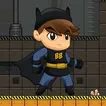








































Superhero Games: The Ultimate Adventure in Gaming
Embark on a journey through the thrilling world of superhero games, where players can experience the power of iconic characters and dive into stories of heroism and villainy. These games offer a unique blend of action, strategy, and narrative, allowing gamers to step into the boots of their favorite caped crusaders or infamous archenemies.
The allure of superhero gaming lies in the excitement of combat, where players can unleash a variety of powers and abilities in their quest for justice or domination. The depth of narrative experiences further enriches these virtual adventures, providing a backdrop of rich lore and ongoing character development that keeps players engaged.
In superhero games, the stakes are always high, and the action is larger-than-life. Whether it’s saving the world from imminent destruction or battling through hordes of minions to face a well-known nemesis, the thrill of the fight is palpable. The interactive nature of these games allows for a personalized experience, where choices and actions have real consequences within the story’s unfolding.
Character progression is another cornerstone of superhero gaming, offering a sense of growth and achievement as players enhance their hero’s or villain’s abilities. This progression not only reflects the journey of the character but also the player’s mastery of the game.
Superhero games are not just about the individual experience; they also contribute to a larger culture, sharing the timeless appeal of comic book stories through a modern medium. They allow fans to live out the fantasies that have captivated audiences for generations, creating a bridge between the pages of comics and the interactive world of gaming.
In essence, superhero games are the ultimate adventure, providing an immersive escape into worlds where good and evil clash, and where every player can find their own path to glory or infamy.
Superhero Game Mechanics: Combat, Progression, and Powers
Superhero games captivate with their dynamic gameplay mechanics, central to which is the advanced combat system. Players engage in exhilarating battles, executing a blend of melee attacks, ranged abilities, and tactical maneuvers. Each skirmish is a dance of power and precision, challenging gamers to outwit and overpower their foes with a superhero’s might.
Character progression is integral to the gaming experience, allowing players to evolve from fledgling heroes into legendary champions. As players navigate through the game, they earn experience points, unlock new abilities, and acquire gear that enhances their character’s stats. This progression system is a rewarding journey that mirrors the growth of superheroes within their own epic sagas.
The use of unique superpowers is what truly sets these games apart. Players revel in the fantasy of wielding extraordinary abilities that define their character. From manipulating the elements to bending time and space, these powers are not only tools for combat but also for solving puzzles and exploring the game’s environment. The careful balance and customization of these powers ensure that each player’s hero or villain feels distinct and personal.
Together, these mechanics create a gameplay experience that is both immersive and empowering. Players are not just controlling a character on a screen; they are embodying a powerful entity in a world where their actions have significant impact. The synergy between combat, progression, and powers makes superhero games an adventure that is as strategic as it is spectacular.
Superheroes Game Storytelling: Crafting Compelling Narratives
Superhero games transcend mere action-packed escapades by crafting compelling narratives that resonate with players. These stories are not just backdrops for the gameplay but are integral to the immersive experience. They draw from the rich tapestry of comic book lore, weaving origin stories, character arcs, and moral quandaries into the fabric of the game.
The storytelling in superhero games often begins with an origin story that sets the stage for the character’s journey. These foundational tales serve as a springboard for deeper exploration into the hero’s or villain’s psyche, motivations, and relationships. As players progress through the game, they are not just completing missions; they are participating in a character’s evolution, facing challenges that test their resolve and shape their path.
World-building is another critical aspect of narrative development in superhero games. The setting is a character in its own right, with its own history, conflicts, and culture. Players become part of a living, breathing universe that reacts to their actions, creating a sense of belonging and investment in the game’s world.
The interactive nature of gaming allows for a unique storytelling approach where choices matter. Players are often faced with moral decisions that can alter the course of the narrative, leading to multiple outcomes and replayability. This agency gives players a personal stake in the story, as their decisions can lead to triumph or tragedy.
In essence, the storytelling in superhero games is about more than just good versus evil. It’s about creating a narrative tapestry that is as complex and nuanced as the characters themselves, providing a connection that lasts well beyond the final battle. Through these stories, players experience the full spectrum of what it means to be a superhero or a supervillain, making every decision, every victory, and every defeat profoundly personal.
Super Hero Games’ Impact on Video Game Culture
Superhero games have left an indelible mark on video game culture, shaping it with their larger-than-life characters and epic storylines. They’ve evolved in tandem with the comic books that inspire them, bringing the vibrant panels to life and allowing players to experience the thrill of being a part of a superhero universe. This genre has expanded the lore of beloved characters, introducing new narratives and possibilities that enrich the source material.
The influence of superhero games extends beyond their storylines and characters; they have pioneered gameplay mechanics that have been adopted by other genres. The integration of unique powers into combat and exploration has encouraged developers to think creatively about how players interact with the game world. These mechanics have set a standard for immersion and player agency that has become a benchmark in the industry.
Moreover, superhero games have played a significant role in mainstreaming video games as a form of entertainment. They’ve attracted audiences who might not traditionally consider themselves gamers, bridging the gap between different forms of media consumption. The cultural impact is evident as discussions about these games often spill over into conversations about movies, television, and literature, highlighting the interconnectedness of modern media.
The legacy of superhero games is also evident in the community and fan culture that has grown around them. They have inspired fan art, cosplay, and an active online discourse, fostering a community that is as passionate and diverse as the characters they adore. The shared experiences of triumphs and defeats in these games have brought players together, creating a collective identity that celebrates the heroic spirit.
In essence, superhero games have not just contributed to the evolution of gaming; they have become a vital part of the cultural zeitgeist, influencing how stories are told and experienced across various platforms. They’ve shown that video games are not just entertainment but a powerful medium for storytelling and community building.
The Role of Villainy in Superhero Games
The intrigue of playing the antagonist in superhero games offers a deliciously dark twist to the narrative. Villainy provides a unique perspective, allowing players to explore the motivations and complexities behind some of gaming’s most notorious adversaries. These characters often have rich backstories and a depth that can be just as engaging as their heroic counterparts.
Gameplay as a villain often involves strategic planning and cunning, as players must navigate through a world that is predisposed to their failure. This can lead to a more challenging and rewarding experience, as every victory feels hard-won against the forces of good. The moral choices presented to players can be more nuanced and morally ambiguous, pushing them to consider the implications of their actions in a world where the line between right and wrong is blurred.
The psychological draw of villainy cannot be understated. It taps into the allure of power and the freedom to break the rules that bind heroes. Players get to indulge in the fantasy of causing chaos and shaping the game world according to their own vision, which can be a cathartic escape from the everyday.
Moreover, villains complement the heroic narrative by providing a worthy opponent. They add tension and conflict, which are essential for a compelling story. The presence of a strong antagonist can elevate the stakes and make the hero’s journey more significant. In this way, villainy is not just a role to be played but a critical element that enhances the overall gaming experience.
In essence, the role of villainy in superhero games adds a rich layer of complexity to the genre. It allows players to explore themes of power, morality, and resistance, providing a counterpoint to the traditional hero’s journey and enriching the tapestry of the superhero narrative.
